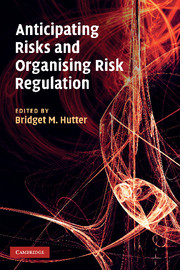Book contents
- Frontmatter
- Contents
- Contributors
- Preface
- Part I Introduction
- Part II Threat, vulnerabilities and insecurities
- Part III Social, organisational and regulatory sources of resilience and security
- 7 Regulating resilience? Regulatory work in high-risk arenas
- 8 Critical infrastructures, resilience and organisation of mega-projects: the Olympic Games
- 9 Creating space for engagement? Lay membership in contemporary risk governance
- 10 Bioethics and the risk regulation of ‘frontier research’: the case of gene therapy
- 11 Preparing for future crises: lessons from research
- 12 Conclusion: important themes and future research directions
- References
- Author index
- Subject index
9 - Creating space for engagement? Lay membership in contemporary risk governance
Published online by Cambridge University Press: 10 November 2010
- Frontmatter
- Contents
- Contributors
- Preface
- Part I Introduction
- Part II Threat, vulnerabilities and insecurities
- Part III Social, organisational and regulatory sources of resilience and security
- 7 Regulating resilience? Regulatory work in high-risk arenas
- 8 Critical infrastructures, resilience and organisation of mega-projects: the Olympic Games
- 9 Creating space for engagement? Lay membership in contemporary risk governance
- 10 Bioethics and the risk regulation of ‘frontier research’: the case of gene therapy
- 11 Preparing for future crises: lessons from research
- 12 Conclusion: important themes and future research directions
- References
- Author index
- Subject index
Summary
In this chapter, we explore one important aspect of contemporary risk governance: attempts to incorporate a ‘public’ or ‘lay’ contribution within decision-making. Recent years have seen a discourse of engagement and public participation develop within European policy institutions. In many instances, rhetoric has been accompanied by practices such as stakeholder forums, citizens' juries and a host of other engagement activities. Yet despite this flurry of talk and action, questions remain as to the extent to which traditional, often technocratic, cultures of risk regulation are able to permit meaningful interaction between publics and decision makers. Have such moves transformed the culture of risk regulation, or has there instead been a more marginal shift in governance processes and imaginations? More specifically, we will consider whether the development of lay engagement is creating innovative forms of regulatory space in which, for example, new knowledge relations are produced. Experimentation with wider engagement raises profound questions concerning both the epistemological basis on which decisions are currently made, and the relationship between scientific governance (especially the operation of scientific bureaucracies) and movements towards enhanced scientific citizenship.
Following several public controversies – including those over genetically modified foods, energy policy and stem cell research – the European governance of risk has increasingly been portrayed as a contested area. There is little evidence of a widespread societal unease over science and technology (despite occasional efforts by politicians and others to summon up such a generalised – or anti-scientific – reaction: Blair 2002; Felt and Wynne 2007).
- Type
- Chapter
- Information
- Anticipating Risks and Organising Risk Regulation , pp. 185 - 207Publisher: Cambridge University PressPrint publication year: 2010
- 4
- Cited by



